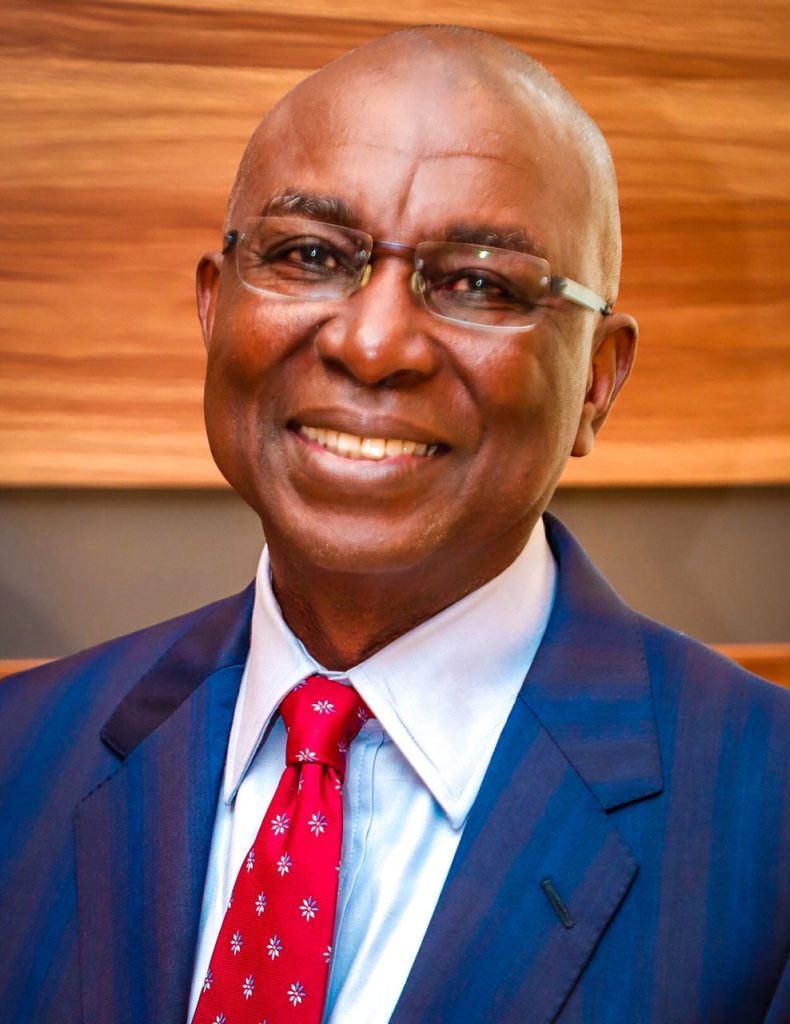
 Dr. Dayo Mobereola’s appointment as the Director General of the Nigerian Maritime Administration and Safety Agency (NIMASA) signifies a new era for the agency.Saddled with overseeing West and Central Africa’s leading maritime regulatory agency, Dr. Mobereola faces the task of navigating through challenges and maximizing opportunities for growth and development in the region. This article,by Shipping World’s ASU BEKS highlights key strategies he can adopt to avoid potential pitfalls and navigate the tricky waters of maritime governance effectively.
Dr. Dayo Mobereola’s appointment as the Director General of the Nigerian Maritime Administration and Safety Agency (NIMASA) signifies a new era for the agency.Saddled with overseeing West and Central Africa’s leading maritime regulatory agency, Dr. Mobereola faces the task of navigating through challenges and maximizing opportunities for growth and development in the region. This article,by Shipping World’s ASU BEKS highlights key strategies he can adopt to avoid potential pitfalls and navigate the tricky waters of maritime governance effectively.
With his appointment on March 12, 2024, Dr Mebereola became NIMASA’s eighth director general since the agency emerged from the union between the Nigerian Maritime Authority and Joint Maritime Labour Industrial Council (JOMALIC). The new helmsman, who parades an impressive resume with a bias for Transport Administration, is set to raise the bar in Nigeria’s maritime domain and has received more than a handful of endorsements from key stakeholders pledging their support to ensure that the core mandate of the agency is realised.
The former Commissioner of Transportation in Lagos State and one-time Managing Director of the Lagos Metropolitan Area Transport Authority (LAMATA), who has assumed duties with a promise to build a purpose driven NIMASA, undoubtedly has his work cut out for him. The multifaceted nature of the maritime industry and the complexity of the Nigerian environment in particular, coupled with the activities of vested interests, he must be warned, have become the undoing of many of his predecessors.
As he settles into this crucial leadership role, it’s imperative to learn from the successes and shortcomings of his predecessors to steer clear of potential pitfalls and navigate the waters of governance effectively. As keen observers of the dynamics and intrigues of maritime administration in Nigeria, Shipping World seeks to draw his attention to certain variables pivotal to the outcome of his appointment.
Understanding the Role of NIMASA.
For us at Shipping World, the most important task at hand for Dr Mobereola is to seek knowledge and a clear understanding of NIMASA’s statutory responsibilities to the Nigerian establishment. For clarity, the agency’s core function, as enshrined in its establishment Act, is to ‘pursue the development of shipping and regulatory matters relating to merchant shipping and seafarers’.
This singular responsibility can be likened to the biblical injunction contained in Mark 12 verse 13 that says, “…Love your neighbour as yourself. There is no other command greater than these.” Emphasis on ‘…there is no other command greater than these’. However, over the years, successive administrations have lost sight of this mandate and have deployed the agency’s resources to cater to mundane and unrelated ventures, including political patronage and misplaced corporate social responsibility projects, at the expense of the industry and its core stakeholders.
It is therefore, important for Dr Mobereola to exert NIMASA’s authority as the apex regulatory and development agency in Nigeria that is focused on improving the human capacity index, ensure maritime safety and security and accelerate the adoption of sustainable processes across the maritime industry. Dr Mebereola must be made to understand that NIMASA is neither a ‘Disaster Management/Response Agency nor is it the Humanitarian Ministry’ responsible for doling out palliatives to victims of natural disasters and emergencies.
Embrace Transparency and Accountability.
Transparency and accountability have been longstanding issues within NIMASA, with past administrations facing criticism for lack of transparency in financial management and decision-making processes. Over the years, the mismanagement of funds and lack of proper auditing mechanisms have tarnished the agency’s reputation and hindered its effectiveness. For instance, the tenure of former Director General Patrick Akpobolokemi was marred by allegations of financial mismanagement and corruption. Akpobolokemi was indicted by the Economic and Financial Crimes Commission (EFCC) for allegedly embezzling billions of Naira from the agency’s coffers. Such scandals eroded trust in NIMASA and undermined its credibility as a regulatory body.
To avoid repeating these mistakes, Dr Mobereola must prioritize transparency and accountability in all aspects of NIMASA’s operations. This includes implementing open and transparent processes for procurement, budgeting, and expenditure tracking. By ensuring that financial transactions are conducted with integrity and accountability, he can rebuild trust among stakeholders and enhance the agency’s reputation.
With regard to the controversial and perennial issue regarding disbursement of the Cabotage Vessel Finance Fund (CVFF), Shipping World urges the new DG to write his name in gold by midwifing the process into fruition and avoid the narrative to divert the funds for establishment of the proposed Maritime Bank as alleged in some quarters.
Foster Collaboration and Partnerships.
Effective collaboration is essential for addressing complex challenges facing Nigeria’s maritime industry, such as piracy, oil theft, illegal fishing, and environmental pollution. However, past administrations have been criticized for their failure to engage with key stakeholders, including government agencies, industry associations, and international organizations. This lack of collaboration resulted in increased incidents of piracy and maritime crime in Nigerian waters, negatively impacting the country’s maritime reputation.
Dr Mobereola must proactively seek collaborations and partnerships within and outside the maritime industry to leverage resources, expertise, and networks for the benefit of the agency and the maritime sector as a whole. By working closely with relevant stakeholders, he can address complex challenges more effectively, harvest low-hanging fruits and drive sustainable development. By working together towards common goals, such as enhancing maritime security and promoting sustainable development, NIMASA can achieve greater impact and effectiveness in its operations.
Prioritize Safety and Security
Safety and security have been perennial challenges for Nigeria’s maritime industry with past administrations facing intense criticism for incidents of piracy and maritime crime in the Gulf of Guinea and within the country’s Exclusive Economic Zone (EEZ). However, with Nigeria’s unprecedented enactment of the Suppression of Piracy and Other Maritime Offences (SPOMO) Act in 2019, the agency is now effectively positioned to identify, investigate, prosecute and punish perpetrators of maritime crimes and other related offences.
Dr Mobereola must build on the successes of the SPOMO instrument as a tool for enhanced maritime safety and security. This includes investing in technology and infrastructure to enhance surveillance and response capabilities, as well as strengthening collaboration with maritime security agencies and international partners to mitigate risks and enhance the overall resilience of Nigeria’s maritime industry.
Promote Capacity Building and Skills Development
A skilled workforce is essential for the growth and competitiveness of the maritime sector. Dr Mobereola should prioritize capacity building initiatives to equip NIMASA staff and maritime professionals with the necessary knowledge, skills, and competencies. By investing in human capital development, he can strengthen NIMASA’s institutional capacity and ensure a pipeline of skilled talent to effectively regulate and promote the maritime industry.
Embrace Technological Innovation
In an increasingly digital and interconnected world, technological innovation is key to driving efficiency, productivity, and competitiveness in the maritime sector. However, without prejudice to the efforts of previous administrations, digital innovation has been underutilized within NIMASA and across other facets of the Nigerian maritime industry, with past administrations failing to harness the full potential of emerging technologies to improve efficiency and effectiveness.
To avoid falling behind, Dr Mobereola should embrace technological innovation as a key driver of change within the agency. This includes leveraging technologies to enhance regulatory compliance, improve service delivery, and streamline operations. By embracing innovation, he can position NIMASA as a forward-thinking and agile regulator, capable of meeting the evolving needs of the maritime industry.
Enhance Regulatory Compliance and Enforcement
Effective regulation is essential for maintaining order and integrity within the maritime sector. Dr Mobereola should review and strengthen NIMASA’s regulatory framework to ensure compliance with international standards and best practices. This includes updating existing regulations, closing loopholes, and introducing new measures to address emerging challenges such as environmental protection and cybersecurity. Moreover, he should enhance enforcement mechanisms to deter non-compliance and sanction violators effectively.
Conclusion
As Dr Dayo Mobereola assumes the role of Director General of NIMASA, he faces a myriad of challenges and opportunities in steering the agency towards success. He must draw on his years of experience and also learn from the mistakes of past administrations to avoid getting tripped up by banana peels that will invariably be tossed along his path. Ironically, his is a thankless job that requires him to maintain a delicate balance between delivering the mandate of his appointment to the Nigerian people as well as remaining in the good books of his benefactor, and perhaps aspire to greater things. This is where his fate lies.
Brief Profile
Dr. Mobereola attended St. Patrick’s Grammar School in Ibadan.
He later obtained an MSc and a Ph.D. in Transport Economics from the University of Wales, United Kingdom, and is a Fellow of the Chartered Institute of Transport, both in England and Nigeria. His studies exposed him to Social Development and Welfare, Maritime Safety and Security Management, and Maritime Piracy and Transnational Criminal Activities.
He started work at WS Atkins Watkins in the United Kingdom as a Consultant for four years. He returned to Nigeria where he occupied various leadership roles such as Managing Director of Lagos Metropolitan Area Transport Authority (LAMATA) from 2003 to 2015 and Commissioner for Transportation in Lagos State from 2015 to 2016.
Additionally, he has held positions as Deputy Managing Director and Project Development Director at AFM Consulting Plc, London, and as a Senior Economist at British Petroleum Shipping Limited, London.
His extensive work experience has equipped him with skills in Transportation, Business strategy, Strategic Planning, Management, Operations Management, Consulting, Negotiation, Project Planning and others.

